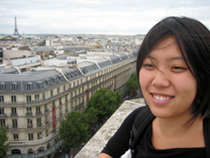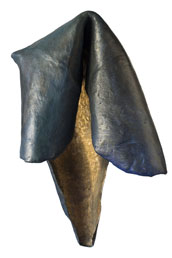Fiction Review
Wandering Souls in Paradise Lost
By Hélène Rioux, translated by Jonathan Kaplansky
Toronto, ON: Cormorant Books, 2010
354 pp. $21.00
Those of us living in Eastern Canada know the cruelty and bleakness of spring days – the paradoxical snow days and blustering winds in the season of supposed rebirth. So it’s only apt that spring equinox in Montreal serves as the opening scene of Hélène Rioux’s Wandering Souls in Paradise Lost, where modern-day narratives of loss, darker desires and survival intersect with history’s own dark moments.
Each chapter is devoted to a different character in their separate locale (though Montreal’s various neighbourhoods – namely, Outremont and Little Italy – appear a few times throughout), stuck in their own version of hell. The novel begins with an ex-exotic dancer who is reluctantly working at a diner frequented by cab drivers. Other characters have more prestige, but are just as miserable, like a recently retired and divorced literature professor, whose yearning for companionship brings him out of his Montreal home to a sunny Cabarete in Dominican Republic. There’s also a renowned psychologist, who ironically did not foresee her daughter’s dark psychological problems that caused her to run away.
At first glance, the characters seem to have little or no connection to each other, until Rioux surreptitiously reveals how the characters’ lives are intertwined with one another (Each epigraph that begins the chapter comes from other chapters, also reinforcing this notion). The connection may be as loose as an overlapping song on the radio, or sharing a mutual acquaintance or a family member. As the novel carefully unravels the inter-connectedness of the solitary characters, Rioux seems to hint that even the darkest pit of loneliness is a shared burden.
Dante and Milton are frequently invoked, and are always incorporated somehow into each character’s life to create yet another kind of connection. If scholars or writers are not invoking The Divine Comedy or Paradise Lost directly on the page, shadowy legacies of the literary giants can be found in names of establishments like the Sol Paradiso hotel, The Lost Paradise Restaurant, or The End of the World diner. Some invoke the famous authors and their characters in their very being with names like John Paradis and Beatrice.
Just as Paradise Lost focuses on the sinful apple as metaphor for humankind’s desire, Wandering Souls also spends a good portion of the novel dedicated to food. Rioux is a master of describing the sumptuous delights of crisp greens, warm goat cheese, and sweet pastries. And just as Eve’s – and eventually Adam’s – succumbing to the apple awakens the turmoil that gets them shunned from their own paradise, some characters in Rioux’s universe also face a new dimension of unhappiness followed by their gastronomic consumptions. This is the most evident in Andy, an epicurean film critic, who enjoys a too-rich meal in New York City’s fine French restaurant, only to watch his mother seduce his love interest.
There are some translation issues in the text, where certain French words are translated so directly that the English counterpart sounds downright bizarre or arcane: “she is eighth, and that augurs well” (172). Some copy-editing errors, including stray apostrophes and quotation marks, also detract from the text at times.
Despite the translation issues, the highly descriptive and poetic language Rioux uses is a delight to read through, which delves deeply into the tempestuous emotional states of each character. Rioux also masterfully paints the atmosphere of each wildly different locale with a panoramic, cinematic stroke.
Wandering Souls at the End of Paradise Lost is not only rationally demanding, but also emotionally so. Even though the events in the characters’ lives are tragic, the book itself provides no cathartic release. One of Aristotle’s category of tragedy was “the unity of action” or completeness in plot. In Rioux’s text, there is no end to the characters’ sufferings, nor is there any indication that their lives will get worse or better. But perhaps that is Rioux’s point after all – no perfect art form can foresee or imitate the cruel uncertainty of life.





No Comments so far ↓
There are no comments yet...Kick things off by filling out the form below.